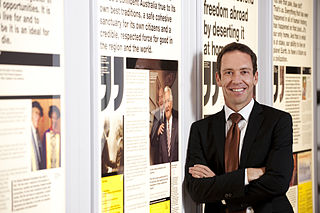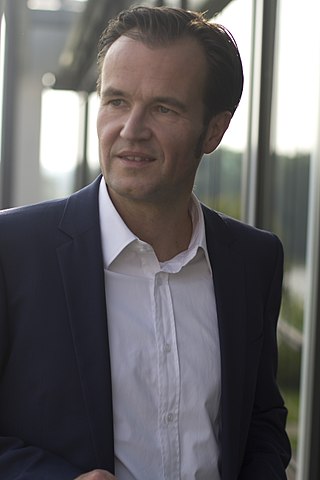
Conjoint analysis is a survey-based statistical technique used in market research that helps determine how people value different attributes that make up an individual product or service.
Harald Rosenthal is a German hydrobiologist and fisheries scientist known for his work in fish farming, ecology, and international cooperation.
Patents are legal instruments intended to encourage innovation by providing a limited monopoly to the inventor in return for the disclosure of the invention. The underlying assumption is that innovation is encouraged because an inventor can secure exclusive rights and, therefore, a higher probability of financial rewards for their product in the marketplace or the opportunity to profit from licensing the rights to others. The publication of the invention is mandatory to get a patent. Keeping the same invention as a trade secret rather than disclosing it in a patent publication, for some inventions, could prove valuable well beyond the limited time of any patent term but at the risk of unpermitted disclosure or congenial invention by a third party.

The Gottfried Wilhelm Leibniz Prize, or Leibniz Prize, is awarded by the German Research Foundation to "exceptional scientists and academics for their outstanding achievements in the field of research". Since 1986, up to ten prizes have been awarded annually to individuals or research groups working at a research institution in Germany or at a German research institution abroad. It is considered the most important research award in Germany.
The following outline is provided as an overview of and topical guide to marketing:

Byron Sharp is a Professor of Marketing Science at the University of South Australia, known for his work on loyalty programs.

Michael Fritsch is professor (emeritus) of Economics at the Friedrich Schiller University Jena, Germany. He is also an Associate Editor of the academic journal Small Business Economics.
T-Labs, formerly known as "Telekom Innovation Laboratories", is the R&D unit of Deutsche Telekom. T-Labs current research areas are: Future Networks, Spatial Computing and Decentralized Systems.
Ulrich Lichtenthaler is a German economist who is Professor of Management and Entrepreneurship at the International School of Management in Cologne. He held the Chair of Management and Organization at the University of Mannheim until March 2015.
Lead market is a term used in innovation theory and denotes a country or region which pioneers the successful adoption of an innovative design. It sends signalling effects to other "lag" markets, which in turn helps in triggering a process of global diffusion. Marian Beise, one of the foremost propounders of this theory as it has been understood so far, states: "Innovations that have been successful with local users in lead markets have a higher potential of becoming adopted world-wide than any other design preferred in other countries". Christoph Bartlett and Sumantra Ghoshal have described lead markets as "[…] markets that provide the stimuli for most global products and processes of a multinational company. Local innovations in such markets become useful elsewhere as the environmental characteristics that stimulated such innovations diffuse to other locations". To illustrate a lead market with some examples, Germany can be seen as a lead market for renewable energies and (premium) automobiles, while the United States would suit as a lead market for information technologies including e-commerce.
Alan Pilkington is a British engineer and researcher known for his work in technology management, operations management, Manufacturing strategy and enterprise engineering. He has been a professor at the Copenhagen Business School, Hult International Business School and S P Jain School of Global Management. He is currently Professor of Technology Management at Westminster Business School in London. He is past chair of the IEEE Technology Management Council for the UK and Republic of Ireland joint chapter on engineering management.
Klaus Brockhoff is a German economist, organizational theorist and Emeritus Professor at the University of Kiel.
Mariusz Malinowski is a Polish electrical engineer. Professor in the Institute of Control and Industrial Electronics at Warsaw University of Technology.
Désirée H. Ladwig is a German economist.
Werner Bergmann is a German sociologist. He is Professor of Sociology at the Center for Research on Antisemitism at Technische Universität Berlin.

Oliver Kaul is a Professor of Marketing and International Management at University of Applied Sciences, Mainz.

Ulrike Tikvah Kissmann is a German sociologist.
Bernd Sponheuer is a German musicologist.

Marc Gruber is a management scholar and researcher specialized in technology commercialization. He is a professor at EPFL, and holds the Chair of Entrepreneurship and Technology Commercialization at EPFL's College of Management of Technology. In 2022, he was made Chief Editor of the Academy of Management Journal. In 2016, he has been named among the five most influential researchers worldwide in entrepreneurship research.
Jörg Stolz is a Swiss and German sociologist, Professor of Sociology of religion at the University of Lausanne, Switzerland. His research mainly focuses on secularization, evangelicalism, and religiosity. He combines an explanatory approach with quantitative methods and mixed methods.






